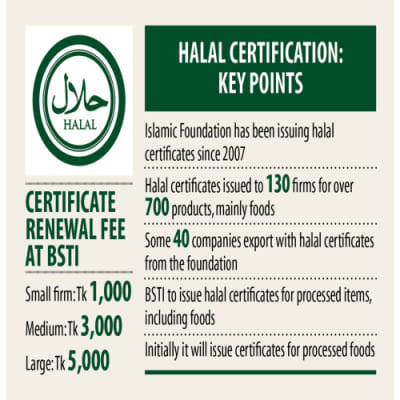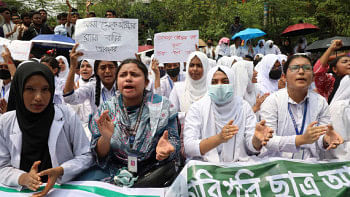BSTI too will issue halal certificates

Bangladesh Standards & Testing Institution (BSTI) is going to issue halal certification for processed products, particularly processed foods, to facilitate exports.
The standards agency will be the second organisation in Bangladesh to award halal certification for locally made products, mainly foods. The Islamic Foundation Bangladesh is already issuing such certificates.
In a notice last week, the BSTI, an agency of the industries ministry, added the provision of halal certification to the BSTI Regulations, 1989.
It said it would issue halal certification marks for processed goods, cosmetics, medicines and other processes or services in line with Islamic laws.
Md Reazul Haque, deputy director for certification marks of the BSTI, said the state-run agency decided to provide the halal certification marks to facilitate exports of processed foods.
"We will issue the halal certifications for processed foods and cosmetics initially. The BSTI is known internationally because of its relations with international standards organisations, so we believe that our halal certificates will receive acceptance globally."
The BSTI aims to give a boost to exports to the Middle East and Muslim-majority countries.
"We will also issue halal certification for firms that cater to the domestic market," Haque said.
The Islamic Foundation says it has been issuing halal certificates and logos to local manufacturers since 2007 to support the shipment of processed foods to international markets, mainly the Middle East.
Globally, there is over a trillion-dollar market for halal items, and the Islamic Foundation has so far issued halal certificates to 130 companies for more than 700 products, said Abu Saleh Patwary, deputy director at the Department of Halal Certificate.
More than 40 companies are exporting products to at least 35 countries after securing the halal certificates, he said.
"The BSTI does not have the mandate to issue halal certificates."
BSTI's Haque declined to comment on the issue.
Khurshid Ahmad Farhad, general manager of the international marketing department of Bombay Sweets & Co Ltd, said it was better to deal with the issue by one organisation.
Kamruzzaman Kamal, director for marketing of Pran-RFL Group, said halal certification was usually required in some cases in exporting products, especially in Muslim-majority countries.
"Moreover, in some non-Muslim countries, there is a segment for halal products, and halal certification is also required in that case."
He said Pran-RFL Group usually uses the halal certificate from the Department of Islamic Development Malaysia as there had been no certifying body in Bangladesh before.
When the Islamic Foundation introduced the certification, it also took certificates from it for some sectors, Kamal said.
"Now, the BSTI has started. I think this is a good initiative. If the authorities extend these supports locally, it will definitely be better. If accepted globally, the certification will be useful in case of exports," he added.
Bangladesh shipped around $1 billion worth of halal products in 2020-21 financial year, out of which about 70 per cent went to Muslim-majority countries, according to Md Iqtadul Hoque, general secretary of the Bangladesh Agro-Processors' Association.
If the BSTI gives halal certificates, it will get some advantage in Muslim-majority countries, he said.
According to the notification of the BSTI, the certificate or renewal fee for small industries is Tk 1,000, Tk 3,000 for medium-sized industries, and Tk 5,000 for large industries.
The certificate will be given for three years. After the expiry of the period, companies can apply for renewal.

 For all latest news, follow The Daily Star's Google News channel.
For all latest news, follow The Daily Star's Google News channel. 



Comments